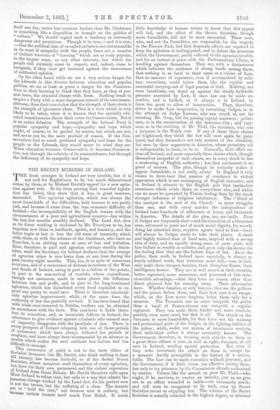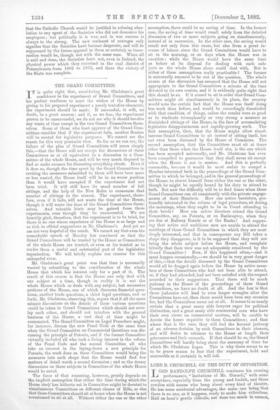THE RECENT MURDERS IN IRELAND.
THE fresh outrages in Ireland are very terrible, but it is not well for Englishmen to be too much disheartened either by them, or by Michael Davitt's appeal for a new agita- tion against rent. So far from proving that remedial legisla- tion has failed, they show that it has, in great measure, succeeded. The agrarian agitation, which was always the most formidable of the difficulties, both because it was partly just, and because it arose from the true economic difficulty of Ireland—the incompatibility of the English tenure with the circumstances of a poor and' gricultural country—has within the last few months sensibly declined. The Land Act, slow as its direct working is confessed by Mr. Trevelyan to be, has begotten new ideas in landlords, agents, and tenantry, and the latter begin at last to lose the old sense of insecurity which with them, as with the artisans of the Continent, who have no Poor-law, is an abiding cause at once of fear and irritation. Rent, therefore, is paid and agrarian outrage steadily dimin- ishes, until the Secretary for Ireland declares that the average of agrarian crime is now lower than at any time during the past twenty-eight months. This, too, is in spite of numerous evictions, and of a recurrence of distress in sections of the West and South of Ireland, owing in part to a failure of the potato, in part to the non-arrival of tourists, whose expenditure, though not enormous, made in some places the difference between loss and profit, and in part to the long-continued agitation, which has disinclined every local capitalist to ex- pend any penny he could save. There is therefore unmistak- able agrarian improvement, while, at the same time, the authority of law has partially revived. It has been found that with trials once removed to Dublin, verdicts can be obtained in accordance with the facts. The murderer is liable there- fore to execution, and, as invariably follows in Ireland, the reluctance to give evidence against criminals who seemed sure of impunity disappears with the paralysis of law. There is every prospect of Ireland relapsing into one of those periods of quiescence which have always followed her periods of eruption, and have always been accompanied by an advance in wealth which makes the next outburst less furious and less difficult to manage. _ This recurrence of quiet is not to the taste either of Socialist dreamers like Mr. Davitt, who think nothing is done
ti l tenancy has become freehold, or of the darker Secret Societies, whose members avail themselves of every agitation, but have for their own permanent end the violent separation of Ireland from Great Britain. Mr. Devitt therefore calls upon West Ireland to refuse rent, but calls in a way that admits the immense change worked by the Land Act, for his pretext now is not the tenure, but the suffering of a class. The tenants are to " hold the rent," not because rent is robbery, but because certain tenants need much Poor Relief. It needs
little knowledge of human nature to know that this appeal will fail, and the effort of the Secret Societies, though more formidable, will not be more successful. These men, who, and not the Parnellites, are responsible for the tragedy in the Phcenix Park, feel that desperate efforts are required to keep the agitation at boiling-point, and to defeat the measures which the Government, partly relieved of the agrarian trouble, and for an instant at peace with the Parliamentary Ultras, is levelling against themselves. They see, with a distinctness which indicates the existence of strong heads among them, that nothing is so fatal to their cause as a regime of Law, that no measure of repression, even if accompanied by mili- tary executions, could injure them like the regular and successful carrying-out of legal process of trial. Nothing, not even fanaticism, can stand up against the steady hydraulic pressure exercised by Law, if once law can be made ex- ecutive, and is backed, as it always is in Ireland, by
force too great to allow of insurrection. They, therefore, strive to make Law inoperative, by terrorising Judges, as in the attempt on Judge Lawson, who was struck at, not for arresting Mr. Gray, bet for passing capital sentences ; police- men, as in the assassination of the detective Cox ; and jury- men, as in the stabbing of Mr. Field, the stationer, who was a juryman in the Walsh case. If any of these three classes are frightened, they think the law will once again be para- lysed, and they themselves not only masters of the situation, but seen by their supporters in America, whose pecuniary aid is indispensable to them, to be so. Naturally, their effort ex- cites all Ireland, and more especially those classes which, though themselves incapable of such crimes, see in every shock to law a weakening of English authority ; but that excitement is no proof of success. The plan, though its audacity makes it appear formidable, is not really astute, In England it only rouses to fever-beat that passion of resistance to violent oppression which is one mainspring of English character, and in Ireland it attracts to the English side that instinctive conscience which exists there, as everywhere else, and which can no more be quenched by Fenian feeling than by the much stronger influence of religious intolerance. The "blood of the martyrs is the seed of the Church " in more struggles than one, and with every murder the independence of Ireland loses hundreds of adherents at home, and thousands in America. The details of the plan, too, are futile. Even if Judges are frequently shot—and the execution of a blameless man, advanced in years and of much social dignity, for merely doing his admitted duty, requires agents hard to find--there will always be Judges ready to take their places. A small and highly trained class of hard men, inspired with a strong idea of duty, and an equally strong sense of caste pride, will face bullets as readily as soldiers, and grow only the sterner for the feeling that they are the forlorn hope of law. As to the police, their work, in Ireland more especially, is always so nearly soldiers' work, that terrorism must fail,—can, in fact, only make their tempers harsher, their discipline firmer, their intelligence keener. They are as well armed as their enemies, better organised, more numerous, and possessed of this inde- structible advantage,—that they have no reason other than direct physical fear for running away. Their adversaries have. Whether fanatics, or only bravoes, they see the gallows and the prison before them, and their first care is an escape, which, as the Law never forgives, helps them only for a moment. The Terrorists can no more vanquish the police than a band of Francs-tireurs can vanquish a regular regiment. They can make them harder and more resolute, possibly even more cruel, but that is all. The attack on the Jurymen is more formidable, for they have not the training and professional pride of the Judges, or the fighting instinct of the police ; while, under our system of unanimous verdicts, their individual action is always accurately known. The Government, therefore, in treating such attacks on them as a great State offence is wise, as well as right, Jurymen, of all men in Ireland, needing special protection. But even if they we're terrorised, the attack on them is, except for a moment hardly perceptible in the history of a nation, futile. The Law can be mede executive without jurymen, and the Government, if it finds terror too effective among them, has only to try prisoners by the Commission already authorised by statute. Crimes like the assault on poor Mr. Field—who ought, if ho survives, to receive an annuity, just as we give one to an officer wounded in battle—are necessarily sterile, and will soon be recognised to be such, even by Secret Societies intent on crippling law. The scheme of the Secret Societies is morally criminal in the highest degree, so criminal that the Catholic Church would be justified in refusing abso- lution to any agent of the Societies who did not denounce his employers ; but politically it is war, and in war success is always to the strong. The new outburst of outrages only signifies that the Societies have become desperate, and will be suppressed by the forces opposed to them as certainly as insur- rection would be, though not with the same ease. When all is said and done, the Societies have not, even in Ireland, the physical power which they exercised in the coal district of Pennsylvania from 1862 to 1876, and there the •victory of the State was complete.







































 Previous page
Previous page